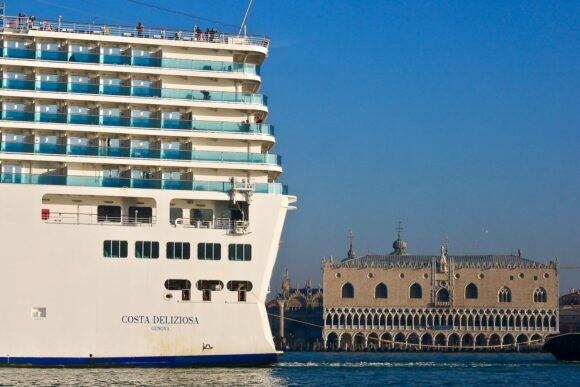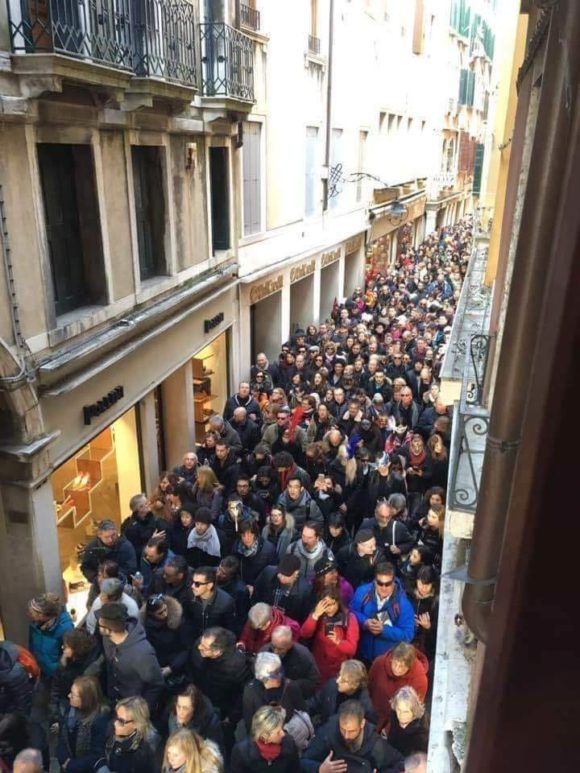Also, es war so: Die UNESCO kommt nach Venedig, um zu klären, ob Venedig mit seinen 33 Millionen Touristen, mit seinen Kreuzfahrtschiffen, dem Ausverkauf der Palazzi an ausländische Investoren und der Vertreibung seiner letzten Einwohner, die wegen AirBnB keine Wohnungen mehr finden, überhaupt noch den Titel als Weltkulturerbe verdient.
Die UNESCO-Delegation kommt an den drei Tagen nach Venedig, an denen sie sicher sein kann, weder ein Kreuzfahrtschiff, noch ein winziges Reisegrüppchen zu finden.
Sie empfängt in ihrem Palazzo (der ihr von der Stadt kostenlos zur Verfügung gestellt wird) die Vertreter der Interessengruppen: die Vertreter der Aktiengesellschaft, die den Kreuzfahrthafen betreibt, der Hoteliers, der Architekten (keine Ahnung warum, vielleicht weil sie das Massaker an Venedig verschönern sollen?). Und ganz am Ende drei Bürgerinitiativen, die die Interessen der venezianischen Bürger vertreten. Jede von ihnen darf fünf Minuten reden.
Ansonsten nur die Freunde des Bürgermeisters.
Daran sollt Ihr denken, wenn es das nächste Mal um den heroischen Einsatz der UNESCO für das Welterbe geht.
Hier auch der Brief von Jane Da Mosto, Gründerin der Non-Profit-Organisation „We are here Venice“ , die bei der „Anhörung“ anwesend war:
We perfectly understand your difficulty in grasping the realities of this extremely precious and iconic World Heritage Site.
There’s one word that I think can sum up the current situation and outlook for Venice and the lagoon: Indifference.
The management plan produced in 2012-13 is just a pile of separate, self-contained boxes produced by each institution – and there are so many – without reflecting a coherent vision or long-term strategic plan.
Each institution is quicker than the next at saying: ‘it’s not my problem.’Reviewing the 43 guidelines in the management plan, we have found that at least 23 points – more than half – remain totally or significantly unaddressed. We know it is not a binding document, but a mirror on reality. It reflects the indifference of the site manager and all the other institutions.
We are here now with five minutes to speak to the distinguished delegation. Please find out from the site manager when it last consulted any of the associations and committees in the room.
The system urgently needs to change – there are fundamental governance issues obstructing representation of the various different communities within the Site.
In the referendum of 1st December 2019, 83% of voters from Venice and the other islands opted for self-governance, distinct from the mainland (where the majority of the current municipal population resides). Admittedly, a significant portion of the population didn’t vote, but it’s fair to say that whoever doesn’t express their opinion has no opinion (a serious problem for the future of democracy). There were also those who obliged the mayor, who had appealed to citizens to abstain from the democratic process.I know this is beyond UNESCO’s remit, but it is important background to our requests:
Specifically involve civil society in updating the management plan
Guarantee transparency and access to all data.
Make more space for local knowledge.
Ensure that the site manager is not a political figure but a technical objective body.
More rigorous participation by the Italian government, which is ultimately responsible for the site and remains aloof to the actual circumstances of Venice and the lagoon.
Venice is tired of being the manifestation of all the world’s worst problems; the canary in the mine that provides morbid fascination as people watch what happens to us to see what might happen to them.WahV is an NGO involved in solutions-based activism with innovative projects in the areas of carbon sequestration, hydrogen propulsion for boats, community participation, urban regeneration etc. We know that Venice has the potential to be a living laboratory and a true source of inspiration and solutions to global issues.


Sehr verehrte Frau Reski,
Alles gut – und auch die neue CD „la differenza“ von Gianna Nannini . Insbesondere der Titelsong „la differenza“ und „per oggi non si muore“. Ich bin hin und weg …
Es drückt beide Daumen für Venedig
Kurt R. Noll